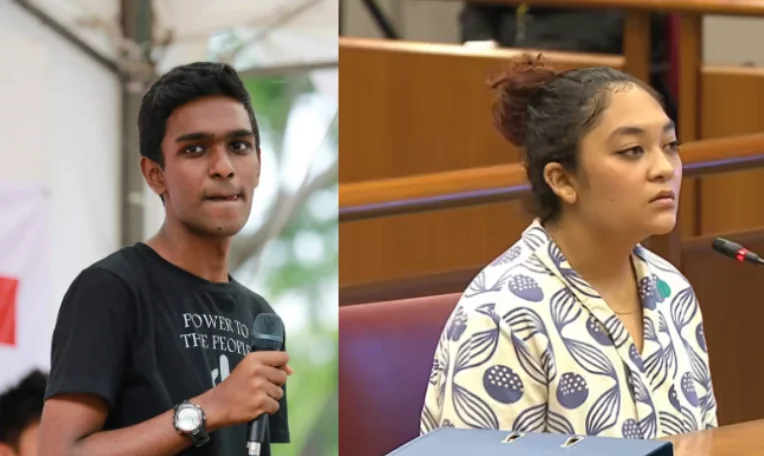Is SDP Ariffin Sha going to be the next Raeesah Khan?
Ariffin Sha is the male counterpart to Raeesah Khan, not in ambition or ideology, but in their shared disregard for facts when narrative suits their cause.

Ariffin Sha, founder of Wake Up Singapore and Singapore Democratic Party (SDP) candidate for GE2025, and Raeesah Khan, former Workers’ Party MP have one thing in common: a failure to uphold truth.
Both, in their respective arenas—alternative media and Parliament—have faltered, revealing a troubling symmetry.
Ariffin is the male counterpart to Raeesah, not in ambition or ideology, but in their shared disregard for facts when narrative suits their cause.
Background
Ariffin, a 27-year-old law graduate and SDP candidate for Marsiling-Yew Tee GRC, built Wake Up Singapore (WUSG) as a platform for socio-political commentary.
A legal executive by day, he manages WUSG, which boasts over 100,000 followers.
In March 2022, WUSG published a fabricated story about a miscarriage at KK Women’s and Children’s Hospital (KKH), alleging staff mishandled a foetus.
The claim, based on doctored documents from KKH patient Ma Su Nandar Htwe, was false.
Ariffin’s platform failed to verify the story, leading to a criminal defamation charge, a guilty plea, and an S$8,000 fine in August 2024. His apology and retraction came only after exposure, too late to restore trust in KKH, which serves 12,000 inpatients annually.
Raeesah Khan, a 31-year-old former MP for Sengkang GRC, committed a parallel offense in August 2021. She claimed in Parliament to have accompanied a rape victim to a police station, where an officer made insensitive remarks. This was a lie, admitted three months later, rooted in her personal trauma but lacking any factual basis.
Her resignation from the Workers’ Party and a recommended S$35,000 fine followed, alongside a breach of parliamentary privilege that eroded trust in elected officials.
Both Ariffin and Raeesah leveraged significant platforms—WUSG’s social media reach and Khan’s parliamentary pulpit—to amplify unverified claims.
Both tackled sensitive issues (healthcare and sexual assault) that demand rigor, not recklessness.
Their admissions of fault, only after being cornered, reveal a willingness to prioritize narrative over truth, whether driven by zeal or negligence.
Dr Chee pleads for "mature" political discourse
At SDP's press conference, Dr Chee was asked how he would respond to any voters concerned about Mr Ariffin Sha’s previous conviction.
He claimed Ariffin had “very ably” made a case for younger Singaporeans and urged a focus on issues over personal attacks. “We want (the) Singapore political system to mature… where we can talk about issues and not go back into past practices where we are just destroying people in terms of talking about their personalities,” Chee said.
He compared Ariffin’s case to PAP politicians’ mistakes, citing former Speaker Tan Chuan-Jin, who resigned in 2023 over an extramarital affair with a Tampines GRC MP. “We want to be judged by the same standards,” Chee added, rejecting “personal demonization.”
Mr Tan resigned from his position and from the PAP in 2024 over an affair he had with a fellow party member who was a Tampines GRC MP.
“We want to be judged by the same standards,” Dr Chee said, adding that he wished to avoid a situation of “personal demonization, that is not in keeping with a mature civilized election campaign”.
Comparing Sha’s conviction to PAP’s Tan Chuan-Jin’s personal scandal, however, is a false equivalence—adultery doesn’t undermine public institutions; spreading falsehoods does.
Chee’s plea to focus on “issues” over “personalities” conveniently ignores that Sha’s lapse is the issue: judgment matters in leadership.
Raeesah’s case is equally indefensible.
Her lie, though tied to personal trauma, was not a slip but a calculated statement repeated thrice in Parliament, undermining the Workers’ Party’s credibility and fueling skepticism about opposition accountability.
Weaponizing sensitivities for moral posturing
Both cases expose a deeper issue: the temptation to weaponize sensitive topics for clout or moral posturing.
Ariffin and Raeesah, in their respective roles, failed to grasp the weight of their platforms, treating truth as negotiable when it suited their ends.
As GE2025 looms, Ariffin's candidacy with SDP and Raeesah's retreat from politics highlight divergent paths but a shared lesson: public figures must be held to a higher standard.
Voters in Marsiling-Yew Tee deserve candidates who prioritize evidence over emotion.
Ariffin's fine may close his legal chapter, but his platform’s lapse raises questions about his judgment. Raeesah's resignation, while accountability of a sort, leaves a stain on the opposition’s claim to moral high ground.
Whether in media or Parliament, the duty to verify, clarify, and rectify is non-negotiable.
Anything less is a disservice to the nation.

